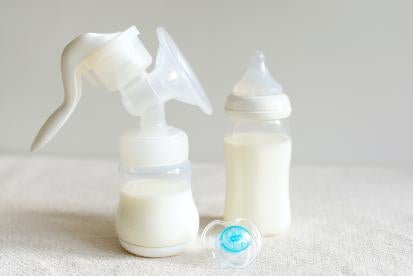Shortly before amendments to New York State’s Nursing Mothers in the Workplace Act (the “Act”) took effect on June 7, 2023, the New York State Department of Labor (NYSDOL) published a model breast milk expression in the workplace policy (the “Model Policy”) for employers to use in complying with the Act.
As we previously reported, the Act’s amendments expand the rights of nursing employees to express breast milk in the workplace by requiring employers to designate certain rooms or locations for employees to use while expressing breast milk, adopt a written breast milk expression policy, and timely distribute said policy to employees. The NYSDOL published the Model Policy pursuant to the Act’s directive.
The Model Policy establishes the minimum standard for compliant breast milk expression policies, so while employers are not required to adopt the Model Policy verbatim, doing so may assist them in ensuring compliance with the Act. Employers that elect to adopt their own breast milk expression policies must be sure that their policies meet or exceed the requirements of the Model Policy. As such, they should be mindful of the three statutory purposes of the Model Policy:
- to inform employees of their rights under the Act,
- to explain the process for requesting use of a designated space to express breast milk, and
- to require employers to respond to such requests within a reasonable timeframe (not to exceed five business days).
Below, we highlight key requirements of the Model Policy, many of which mirror guidance that New York State has long held regarding the rights of nursing mothers.
Employee Rights Under the Act
The Model Policy details a number of specific rights employees have with respect to expressing breast milk in the workplace, including, but not limited to, the following:
- For up to three years following the birth of a child, employees are entitled to unpaid break time to express breast milk. Employers must allow employees to also use their paid break time or meal periods to express breast milk. The new federal Providing Urgent Workers Fairness (PUMP) Act only protects employees for up to one year following childbirth.
- Unpaid breaks must be at least 20 minutes, or 30 minutes if the designated room or location is not near the employee’s workstation; however, employees may choose to take shorter or longer breaks as needed.
- Employees who request break time to express breast milk are entitled to unpaid break time at least every three hours, subject to the individual needs of each employee.
- Employees are not required to make up their unpaid break time but must be permitted to work before or after their normal hours to make up any break time (provided that such time is still within the employer’s normal work hours).
- Employers cannot require employees to work while expressing breast milk, but employees may voluntarily choose to do so. Employers should remember that if a non-exempt employee performs any work during the break, the employee must be compensated for such time.
- Employers may not discriminate against employees for taking unpaid time to express breast milk.
Importantly, the Model Policy confirms that all employees are entitled to these rights and protections, regardless of whether they work remotely or in person. Although lactation spaces are not an employer’s responsibility while employees are working remotely, break times are.
In addition to the above, the Model Policy cautions employers that they must continue to comply with their obligations under other federal, state, and local laws to provide employees with paid and unpaid break and meal times, regardless of an employee’s need to express breast milk. To help employees protect their rights under these laws and the Act, the Model Policy identifies state and federal resources for employees to contact if they believe their rights have been violated, including the NYSDOL and the U.S. Department of Labor.
Process for Requesting Space to Express Breast Milk in the Workplace
Employees are required under the Act to provide their employers with reasonable advance notice of their intent to express breast milk while at work. For employees to comply with this obligation, employers’ breast milk expression policies must include a procedure for employees to provide such notice and request room or space to express breast milk. The Model Policy outlines the following with respect to these procedures:
- If returning from a leave of absence, the employee generally must give the employer notice of their intent to express breast milk at work before the employee returns to the workplace.
- Employees must submit their written request(s) for a room or other location to express breast milk to their direct supervisor or an individual designated by the employer to process the requests.
- Employers, either through the employee’s direct supervisor or the designated individual, must respond in writing to the request within five business days.
- Employers must notify the employee in writing (through email or printed memo) when a room or location has been designated for breast milk expression.
The Model Policy also includes a subsection detailing the type of space or location that employers will provide to employees for expressing breast milk. This subsection:
- outlines the Act’s statutory requirements for the room or location (including if and when access to a refrigerator will be provided) and provides additional details regarding when and how cubicles and spaces with windows can be used for expressing breast milk;
- confirms that employers do not need to provide a separate space for every nursing employee, but instead may dedicate a centralized location to be used by all employees for expressing breast milk;
- provides details for employers located in shared work areas that choose to use a common space to accommodate employees’ need to express breast milk; and
- outlines the type of room or location that will be provided if the employer can establish an undue hardship in providing the required space for expressing breast milk. Notably, the Model Policy confirms that an employer cannot deny an employee’s request to express breast milk in the workplace simply due to difficulty in finding a location.
Employer Obligations
Regardless of whether they choose to adopt the Model Policy as-is or establish their own breast milk expression policies, employers should be mindful that the Act has two distinct requirements:
- Written Requirement. Employer breast milk expression policies must be in writing. Employers may, subject to the timing requirement discussed below, choose to include their policy within an employee handbook or manual or provide the policy as a separate document.
- Timing Requirement. There are three specific times under the Act when employers must provide a copy of the policy to employees—(1) to new employees at the time of hire, (2) on an annual basis thereafter, and (3) upon an employee’s return to work following the birth of a child.
What New York Employers Should Do Now
To comply with the Act’s policy requirements, employers should do the following:
- Either implement the Model Policy or modify already existing policies to align with the minimum required standards therein.
- To the extent you have not already done so, designate proper rooms or locations for employees to express breast milk (and assess whether the workspaces need to be rearranged).
- Ensure that supervisors and human resources personnel are apprised of any changes to existing policies, and provide appropriate training regarding the same, including timing for distributing the breast milk expression policy to employees.
- Continue to monitor the NYSDOL website for additional guidance.
In addition, employers should remain aware of their obligations to pregnant and nursing employees under other similar new laws both at the federal and local levels, including the PUMP Act and the Pregnant Workers Fairness Act (PWFA). This area of the law is likely to remain a focus for advocates, employees, and enforcement agencies alike. For example, the PWFA, which took effect on June 27, 2023, requires covered employers to provide reasonable accommodations to workers with known limitations related to pregnancy, childbirth, or related medical conditions (unless the accommodation will cause an undue hardship on the employer). The Equal Employment Opportunity Commission has already published an updated poster for employers to display in compliance with the PWFA and begun accepting complaints under the PWFA.





 i
i


